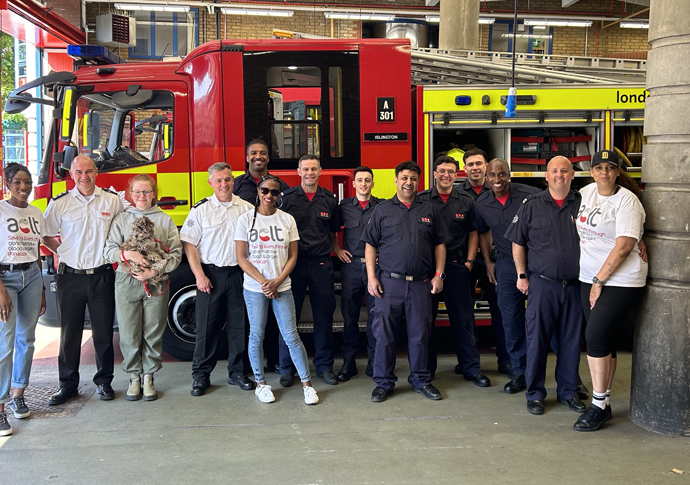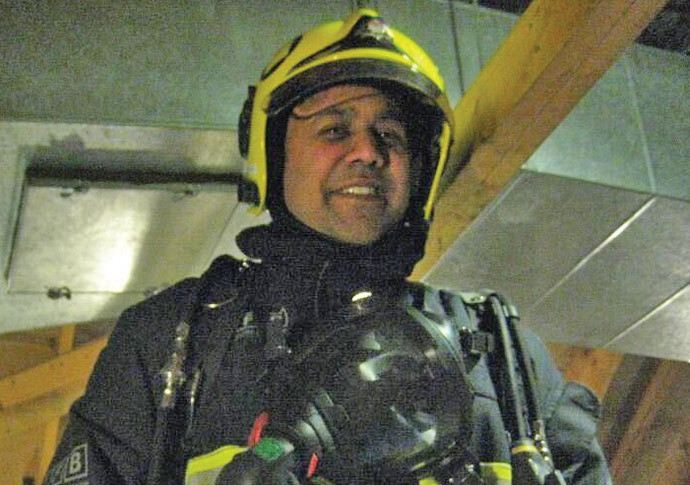‘A moral obligation’: Firefighters who risked their lives call for cancer testing
Research highlights dangers of exposure to dust and chemicals
Friday, 23rd June 2023 — By Izzy Rowley

Islington Fire Brigade at a donations drive with ACLT stem cell volunteers
FIREFIGHTERS exposed to dust and chemicals while saving lives are demanding to be routinely tested for cancer.
Recent research showed those aged between 35 and 39 are 323 per cent more likely to get cancer than their civilian counterparts.
The Fire Brigades Union (FBU) has launched cancer testing for 300 firefighters across London as a result.
Amit Malde, an Islington firefighter and FBU national secretary for black and ethnic minority members, is calling for immediate access to cancer screenings for all firefighters.
“The government needs to see us right by introducing, quickly, a system where all firefighters get regular monitoring and anyone that does find themselves with cancer is given the best treatment early on,” said Mr Malde, who has been a firefighter for more than 10 years.
Firefighters can be exposed to carcinogens while battling blazes. They now go through a recently updated “decontamination” procedure after a job, and wear respiratory gear which protects their lungs.
“Decontamination will definitely limit exposure, especially for people early on in their career and those who join in the future. But, the people that have done a 20 have had all of those years of exposures,” Mr Malde said. “And people like myself, who are over a decade in by the time we discovered this, we have been exposed and we are at risk.”

Amit Malde
Around a dozen of the firefighters who fought the blaze at Grenfell tower in 2017 have since been diagnosed with rare forms of cancer.
Mr Malde said he has started to hear about colleagues facing similar issues. “I was speaking to some people from my old station, and someone has had a benign tumour removed,” he said.
“I was like ‘that sounds like something caused by exposure during fire fighting’ and he’s done over 20 years on the job. He was fortunate enough to catch it.
“When you start hearing about these stories, and then you start hearing about people you know and you work with, it’s worrying.
“It brings it home. It’s a ticking time bomb, it’s going to affect us. It’s a moral obligation for the government, who oversee all 46 fire rescue services, and hold the purse strings for major projects like this. I think it’s only fair that a blank cheque is written on behalf of firefighters.”
A home office spokesperson said: “The health and safety of firefighters is of paramount importance and emerging research indicating that they are being exposed to an increased risk of cancer is concerning. In conjunction with other partners, we are now considering recently published studies to understand their conclusions and our next steps.
“It is the responsibility of fire and rescue authorities to ensure that firefighters receive the appropriate equipment and training they need to safely respond to the wide range of incidents which they attend.”
A London Fire Brigade spokesperson said: “Our firefighters must be as safe as possible at work and we’re currently involved in two studies to investigate the possible effects of contaminants on health and improve the fire and rescue sector’s understanding of the impact of contaminant exposure to firefighters over the course of their careers.
“Our firefighters are given training and appropriate personal protective equipment to ensure that they fully understand the risks of contaminants and the steps they can take to protect themselves.
“We have come a long way in understanding and protecting staff from the hazards they face undertaking their jobs, but this is only possible if we continue to research the risks and the effects they may have.”